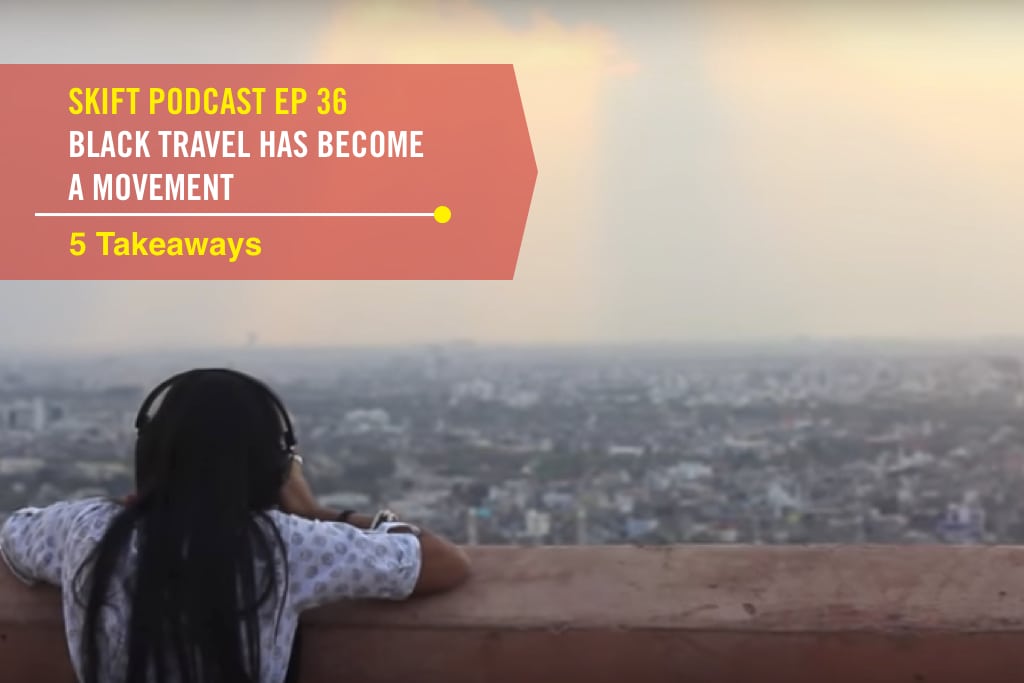Skift Take
The Black Travel Movement in the U.S. has gained serious momentum in the last couple of years, and the industry would be wise to understand the struggles and spending decisions of black travelers. Police brutality and racism on Airbnb's platform are significant parts of the equation.
We looked at the new Black Travel Movement in the U.S. for a recent episode of the Skift Podcast.
Our guests were Evita Robinson, founder of Nomadness Travel Tribe, a travel-centric community of more than 13,000 people, and Shannon Washington, co-founder and director of Parlour Magazine, which focuses on travel and style for black women. They were joined by Skift podcast host Hannah Sampson and co-host Sarah Enelow.
Here are five takeaways from the conversation:
Racism on the Airbnb platform is a bigger problem than Airbnb.
While Airbnb certainly didn’t invent racism, the website is an open forum for the larger societal problem of discrimination, which black travelers face chronically. Skift reported on discrimination on Airbnb’s platform and #AirbnbWhileBlack in June.
Washington recounted one of her “teachable moments” with a white host whose kitchen featured a black-face Aunt Jemima jar. “He was like, ‘Oh, I thought it was vintage’ — No.”
“I do believe in my heart of hearts that they are taking it seriously,” said Robinson of Airbnb’s handling of discrimination on its platform. She also acknowledged that this issue warrants attention. “I personally have never gone through anything that I saw as discrimination from a host on Airbnb. Now, I am a light-skinned, curly-haired girl, culturally ambiguous looking black American, so I may not be your best litmus test.”
Aside from her lack of personal experience with discriminatory home-sharing, Robinson has a positive relationship with Airbnb on a corporate level: The company was a sponsor of her latest Nomadness Conference.
Police brutality is affecting the travel choices of black Americans.
Violence against black Americans has brought about the Black Lives Matter movement, and through social media, these issues are touching the travel sector.
“We have got to have this conversation right now,” said Robinson. “One of the questions that comes up and gets a million comments is like, ‘Okay, if we had to pack up and leave the states, where are we going y’all?’”
Many black American travelers are looking to Africa for a safer, more welcoming experience.
“You’re seeing a trend right now too of a lot of people going back to Africa and exploring the home continent,” said Robinson. “I just can’t explain it, the feeling… for the first thing for them to say to you is ‘welcome home.’”
Technology is changing black heritage tourism.
With the advent of more sophisticated DNA testing, black Americans can trace their roots back to specific countries in Africa better than ever, and this is inspiring many to plan their trips accordingly.
“I think there’s definitely more of a pick up for Africa right now and representing it more than safaris,” Robinson said.
“Safaris are amazingly expensive and kind of boring,” said Washington. “You are starting to see a resurgence of urban Africa. African cities, Accra, Nairobi, people actually picking up in a luxury realm.”
In a similar manner, some black Americans are also taking trips to the American South to trace their more recent heritage.
“There’s so much history here [in the U.S.] that if we continue to overlook it, it dies. We can’t reclaim it. Go to Africa, and then go to Arkansas,” said Washington.
In large part, women are running the movement.
Robinson has been called the grandmother of the Black Travel Movement and black women comprise the majority of Nomadness members.
Washington is also working to show women of color that getting married doesn’t have to end their involvement in travel; in fact, they could find themselves traveling even more.
“I consider women to be better doers, just to be honest. I just do. It’s no coincidence that most of the leading travel publications and portals that are targeted towards African Americans are run by women,” said Washington.
Representation for people of color in travel media is key, both in editorial content and advertising.
According to Mandala Research, 17 percent of African Americans take one or more international trips and travel more than six times a year. But Nielsen reported that only 2.6 percent of all advertising focuses on African Americans.
“[Black Americans] are one of the most loyal segment of consumers that there is. We also spend some of the most money. You can compare the travel industry to the beauty industry in a lot of ways. Once the beauty industry actually woke up and started to talk to African American women, what did they see happen?” asked Washington.
Washington stressed the importance of having people of color on staff to make decisions from a diverse viewpoint.
“Representation matters so much but you have to go beyond the ad,” said Washington. “You can’t write it if you don’t experience it. You know what I mean? When you have diversity and experience, you’re going to have diversity in your readers and you’re going to have more money. Quote me on that.”
The Daily Newsletter
Our daily coverage of the global travel industry. Written by editors and analysts from across Skift’s brands.
Have a confidential tip for Skift? Get in touch
Tags: black travel movement, diversity, podcast, skift podcast, tourism
Photo credit: A traveler is shown in an image from a Nomadness Travel Tribe video. The black travel movement has taken off in America in the last couple of years. Nomadness Travel Tribe
